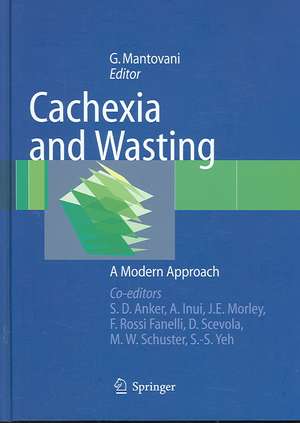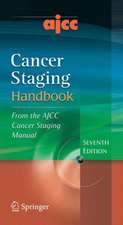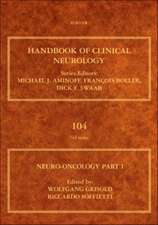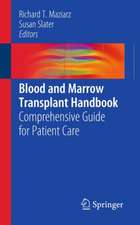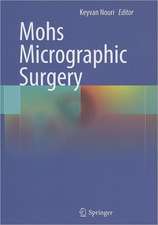Cachexia and Wasting: A Modern Approach
Stefan D. Anker Editat de Giovanni Mantovani Akio Inui, John E. Morley, Filippo Rossi Fanelli, Daniele Scevola, Michael W. Schuster, Shing-Shing Yehen Limba Engleză Hardback – 15 aug 2006
| Toate formatele și edițiile | Preț | Express |
|---|---|---|
| Paperback (1) | 1455.75 lei 38-44 zile | |
| Springer – 22 aug 2016 | 1455.75 lei 38-44 zile | |
| Hardback (1) | 1997.88 lei 38-44 zile | |
| Springer – 15 aug 2006 | 1997.88 lei 38-44 zile |
Preț: 1997.88 lei
Preț vechi: 2103.02 lei
-5% Nou
Puncte Express: 2997
Preț estimativ în valută:
382.39€ • 394.07$ • 322.83£
382.39€ • 394.07$ • 322.83£
Carte tipărită la comandă
Livrare economică 28 februarie-06 martie
Preluare comenzi: 021 569.72.76
Specificații
ISBN-13: 9788847004719
ISBN-10: 8847004713
Pagini: 784
Ilustrații: XXII, 758 p.
Greutate: 2.06 kg
Ediția:2006
Editura: Springer
Colecția Springer
Locul publicării:Milano, Italy
ISBN-10: 8847004713
Pagini: 784
Ilustrații: XXII, 758 p.
Greutate: 2.06 kg
Ediția:2006
Editura: Springer
Colecția Springer
Locul publicării:Milano, Italy
Public țintă
Professional/practitionerDescriere
Cachexia may well represent the flip side of the tremendous achievements of modern medicine.
Many diseases rapidly leading patients to death just a few years ago, are now better controlled by new therapies, and even if we cannot cure and eradicate them, their natural history has significantly increased by months and years. Although these new therapeutic strategies represent a remarkable advantage over the standards of care, it is impossible to ignore that many more patients are now facing the nutritional consequences of prolonged immunological and metabolic challenges deriving from ongoing diseases and aggressive therapies.
Aim of the volume, written by world-renowned scientists, is to provide the best available evidence on the pathogenesis, clinical features and therapeutic approach of cachexia, and to facilitate the understanding of the complex yet unequivocal clinical role of this syndrome, that truly represents a disease, or, better still, a disease within other different diseases.
Many diseases rapidly leading patients to death just a few years ago, are now better controlled by new therapies, and even if we cannot cure and eradicate them, their natural history has significantly increased by months and years. Although these new therapeutic strategies represent a remarkable advantage over the standards of care, it is impossible to ignore that many more patients are now facing the nutritional consequences of prolonged immunological and metabolic challenges deriving from ongoing diseases and aggressive therapies.
Aim of the volume, written by world-renowned scientists, is to provide the best available evidence on the pathogenesis, clinical features and therapeutic approach of cachexia, and to facilitate the understanding of the complex yet unequivocal clinical role of this syndrome, that truly represents a disease, or, better still, a disease within other different diseases.
Cuprins
Anatomy, Historical Perspective and Epidemiology.- Functional Anatomy of the ‘Adipose Organ’.- Body Silhouette and Body Fat Distribution.- Historic Views on Cachexia in Humans with Special Reference to Cardiac Cachexia.- Epidemiology of Cachexia.- Biochemistry, Physiology and ‘Clinics’ of Adipose Tissue.- Energy Values of Foods.- Diet-Induced Thermogenesis.- Assessment of Nutritional Status.- Biochemical Parameters of Nutrition.- Nitrogen Balance and Protein Requirements: Definition and Measurements.- Plasma Proteins and Protein Catabolism.- Nutritional Status Assessment.- Immunological Parameters of Nutrition.- Functional Parameters of Nutrition.- The Different Features of Wasting in Humans.- Anorexia.- Starvation: Social, Voluntary, and Involuntary Causes of Weight Loss.- Cachexia Related to Multiple Causes.- Non-AIDS Lipodystrophy Syndrome.- Pathophysiology of Wasting/Cachexia.- Body Composition: Physiology, Pathophysiology and Methods of Evaluation.- Protein Metabolism in Cachexia.- Lipid Metabolism in Cachexia.- Glucose Metabolism.- Cytokines in Cachexia.- Cytokines in Chronic Inflammation.- Biochemistry of the Growth Hormone-Releasing Peptides, Secretagogues and Ghrelin.- Ghrelin as a New Factor in the Central Network Controlling Appetite and Food Intake.- Leptin and Des-acyl Ghrelin: Their Role in Physiological Body Weight Regulation and in the Pathological State.- Brain Mechanisms in Wasting and Cachexia.- Body Weight Regulation and Hypothalamic Neuropeptides.- Medical Causes of Wasting/Cachexia.- Diabetes.- Endocrine Disorders.- Psychiatric Diseases and Depression.- Cachexia in Chronic Kidney Disease: Malnutrition-Inflammation Complex and Reverse Epidemiology.- Gastrointestinal Diseases.- Chronic Obstructive Pulmonary Disease (COPD) and Treatment of COPD-Related Cachexia.- Cachexia in Cardiovascular Illness.- Cachexia and Ageing.- Epidemiology of Malnutrition in the Elderly.- Pathophysiology of Body Composition Changes in Elderly People.- The Pharmacokinetics and Pharmacodynamics of Drugs in Elderly Cachectic (Cancer) Patients.- Pathophysiology of Cachexia in the Elderly.- Cytokines and Disability in Older Adults.- Cachexia and HIV Infection/AIDS.- HIV Infection-Related Cachexia and Lipodystrophy.- Treatment of AIDS Anorexia-Cachexia Syndrome and Lipodystrophy.- Cancer-Related Cachexia.- Cancer Cachexia and Fat Metabolism.- The Role of Cytokines in Cancer Cachexia.- Proinflammatory Cytokines: Their Role in Multifactorial Cancer Cachexia.- Proteolysis-Inducing Factor in Cancer Cachexia.- Lipid Mobilising Factor in Cancer Cachexi.- Dietary Intake, Resting Energy Expenditure, Weight Loss, and Survival in Cancer Patients.- The Ubiquitin/Proteasome System in Cancer Cachexia.- Non-Gl-Malignancy-Related Malabsorption Leads to Malnutrition and Weight Loss.- Omega-3 Fatty Acids, Cancer Anorexia, and Hypothalamic Gene Expression.- The Role of Pineal Hormone Melatonin in Cancer Cachexia.- Eating-Related Distress of Patients with Advanced, Incurable Cancer and of Their Partners.- Challenges of Geriatric Oncology.- Treatment of Cancer Cachexia.- The Current Management of Cancer Cachexia.- The Role of Artificial Nutrition Support in the Cancer Patient.- The Role of Appetite Stimulants for Cancer-Related Weight Loss.- Palliative Management of Anorexia/Cachexia and Associated Symptoms.- Pharmaco-Nutritional Supports for the Treatment of Cancer Cachexia.- A Critical Assessment of the Outcome Measures and Goals of Intervention in Cancer Cachexia.- Meeting the Amino Acid Requirements for Protein Anabolism in Cancer Cachexia.- The Role of Branched-Chain Amino Acids and Serotonin Antagonists in the Prevention and Treatment of Cancer Cachexia.- An Update on Therapeutics: The Cancer Anorexia/Weight Loss Syndrome in Advanced Cancer Patients.- Medroxyprogesterone Acetate in Cancer Cachexia.- Progestagens and Corticosteroids in the Management Cancer Cachexia.- COX-2 Inhibitors in Cancer Cachexia.- Anti-TNF-? Antibody and Cancer Cachexia.- A Phase II Study with Antioxidants, both in the Diet and Supplemented, Pharmaco-Nutritional Support, Progestagen and Anti-COX-2 Showing Efficacy and Safety in Patients with Cancer-Related Anorexia-Cachexia and Oxidative Stress.- Treatment of Cachexia in the Elderly.- Treatment of Cachexia in the Elderly.- Treatment of Sarcopenia and Cachexia in the Elderly.- Management of Weight Loss in Older Persons.- A Global Perspective for the Treatment of Cachexia.- Cachexia: Therapeutic Immunomodulation Beyond Cytokine Antagonism.
Notă biografică
Professor Mantovani is Full Professor of Medical Oncology and Chief of the Division and Laboratory of Medical Oncology at University of Cagliari, School of Medicine, Cagliari, Italy. His research interests include treatment of cancer-related anorexia/cachexia and oxidative stress, combined-modality therapy of human cancers and cancer immunotherapy. He is first author of more than 200 publications in top-rated cancer journals. Many colleagues from all over the world are acting as co-editors.
Textul de pe ultima copertă
Cachexia may well represent the flip side of the tremendous achievements of modern medicine.
Many diseases rapidly leading patients to death just a few years ago, are now better controlled by new therapies, and even if we cannot cure and eradicate them, their natural history has significantly increased by months and years. Although these new therapeutic strategies represent a remarkable advantage over the standards of care, it is impossible to ignore that many more patients are now facing the nutritional consequences of prolonged immunological and metabolic challenges deriving from ongoing diseases and aggressive therapies.
Aim of the volume, written by world-renowned scientists, is to provide the best available evidence on the pathogenesis, clinical features and therapeutic approach of cachexia, and to facilitate the understanding of the complex yet unequivocal clinical role of this syndrome, that truly represents a disease, or, better still, a disease within other different diseases.
Many diseases rapidly leading patients to death just a few years ago, are now better controlled by new therapies, and even if we cannot cure and eradicate them, their natural history has significantly increased by months and years. Although these new therapeutic strategies represent a remarkable advantage over the standards of care, it is impossible to ignore that many more patients are now facing the nutritional consequences of prolonged immunological and metabolic challenges deriving from ongoing diseases and aggressive therapies.
Aim of the volume, written by world-renowned scientists, is to provide the best available evidence on the pathogenesis, clinical features and therapeutic approach of cachexia, and to facilitate the understanding of the complex yet unequivocal clinical role of this syndrome, that truly represents a disease, or, better still, a disease within other different diseases.
Caracteristici
Comprehensive text on fat loss, wasting and cachexia in medicine
Reference for general practioners, specialists such as oncologists, infectivologists and geriatricians, as well as for students and nurses interested in this topic
Reference for general practioners, specialists such as oncologists, infectivologists and geriatricians, as well as for students and nurses interested in this topic
